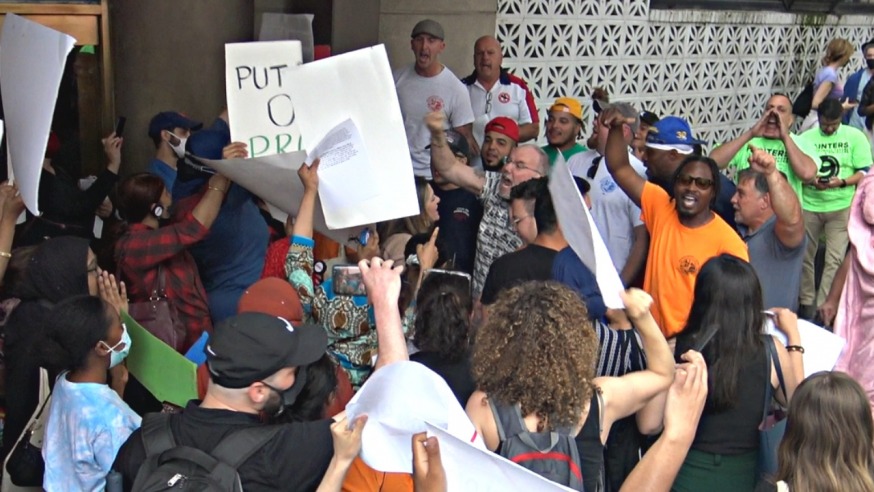
Protestors clash outside the Astoria World Manor Tuesday ahead of the CB1 meeting (Photo: Michael Dorgan, Queens Post)
June 22, 2022 By Michael Dorgan and Christian Murray
The mood was tense and people were passionate but at the end of the night Community Board 1 voted against the Innovation QNS rezoning application that would bring 2,800 units to a five-block manufacturing district in Astoria.
The board voted 24 to 8 to reject the rezoning application Tuesday night during a 4-hour marathon meeting held at the Astoria World Manor. The board also included a list of recommendations for the developers that would make the plan more plausible—such as building size reductions and significantly more affordable housing.
The meeting took place following a series of heated protests that were held outside the venue prior to the 6 p.m. event.
About 100 protesters converged in front of the venue at around 5 p.m. holding an array of different signs that read: “Our lives vs. their profit” “Our neighborhood is not your playground,” “Immigrants Built Astoria, Not Billionaires” and “Astoria is not for sale.”
The protesters had megaphones and were chanting “Astoria is not for sale” and “No to Innovation Queens.”
But for every protester there was a union member in support of the project who also gathered outside the venue. They too were organized, with members of the painters’ union in lime green T-Shirts, while ironworkers in orange shirts.
They were yelling “Build it Now,” and “Union jobs.” The protesters and the union advocates at times were chanting at one another and it at one point got heated.
Some of the union members and protesters got in each other’s faces and it appeared as though a fight might break out—despite there being a heavy police presence.
When the meeting began, tensions began to simmer down and representatives of the development team presented a summary of the mega project, which they have many times since the project was first announced in 2020.
The public got to comment on the project, with more than 100 people taking to the microphone to speak for or against the project. There were hours-long lines to speak that snaked outside the meeting hall. Many gave up—after seeing the lines.
The main room in the Astoria World Manor was packed and the community board opened a second room to cater to the public. That room had a TV that was screening the meeting.
The developers–consisting of Silverstein Properties, Kaufman Astoria Studios and BedRock Real Estate Partners–seek to rezone the area between 37th Street and Northern Boulevard, bound by 35th and 36th Avenues. The developers aim to create a mixed-use zoning district that would include more than a dozen buildings that would range in height from eight to 27 stories
The development would include 2,843 units, with 25 percent of the units, or 711, classified as affordable apartments. The affordable units would be offered at an average of 60 percent of Area Median Income.
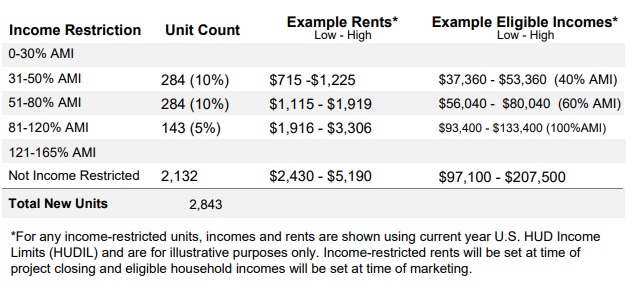
Data provided by the developer in the Racial and Equity Report
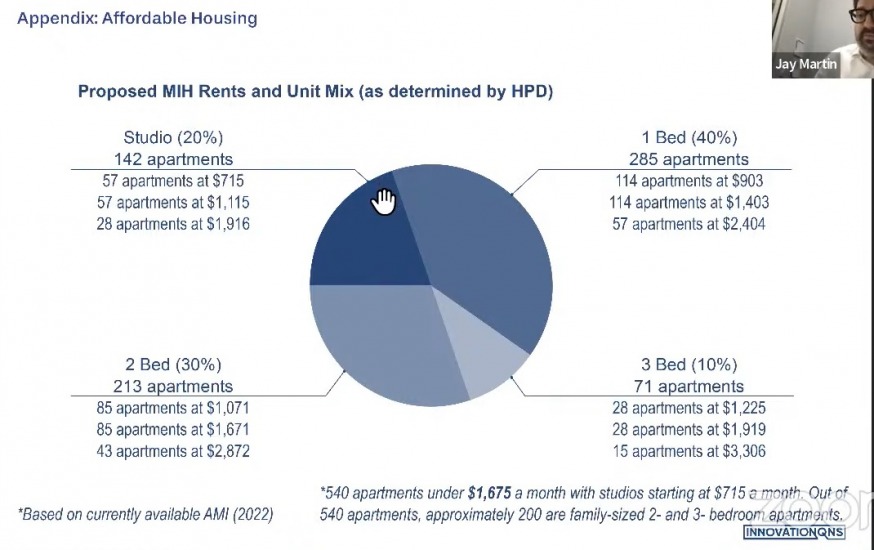
Chart from the developer presentation
The developers, however, are required to provide the affordable housing units, in accordance with the city’s Mandatory Inclusionary Housing (MIH) program. The MIH program requires developers to include affordable housing—typically 25 percent of the units– if a rezoning makes way for additional housing.
The developers were criticized for not providing more affordable units than the minimum required by the city. Assemblymember Zohran Mamdani fired off a tweet prior to the meeting—that was later retweeted by Councilmember Julie Won—criticizing the developers for only providing the legal minimum.
The project’s critics say that it does not include enough affordable apartments.
To build 2120 market rate units with a set aside of only the legal minimum of 25% affordability is not an answer to this housing crisis – it is a cause.
And not all of that “affordability” is even truly affordable, as 5% is a set aside for 120-130% AMI ($112-$121k for 1 person).
— Zohran Kwame Mamdani (@ZohranKMamdani) June 21, 2022
The development, according to renderings, would also include 250,000 square feet of office space, 200,000 square feet of retail offerings, 100,000 square feet of community space and 1,465 parking spaces.
The developers touted that 25 percent of the project area—or 2 acres—would be set aside for public open space, which they would maintain. The project would also see a new supermarket move in and the movie theater would be relocated within the development site. Many local non-profits would also get space.
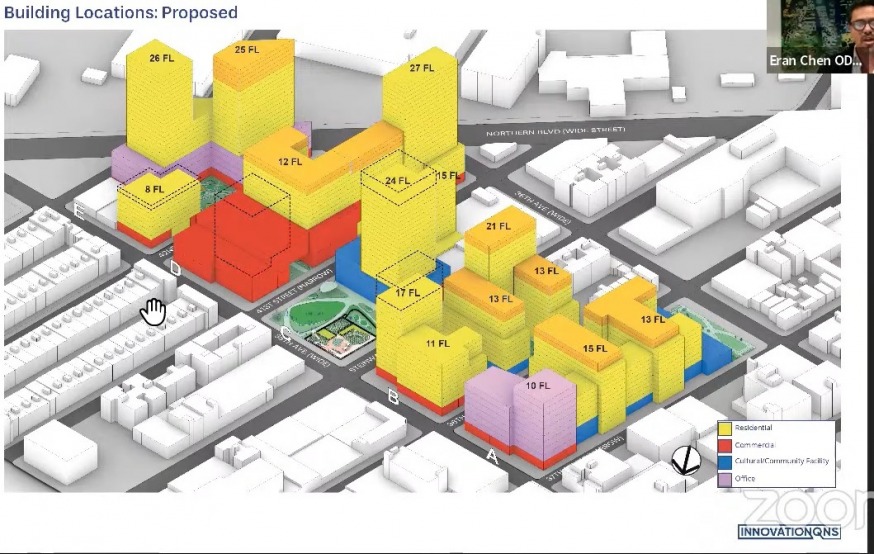
The rendering presented to Community Board 1 (Screenshot)
The community space would be occupied by non-profits such as Jacob A. Riis Settlement, HANAC, the Floating Hospital, MoMI, Urban Upbound and the LGBT Network. There would also be a 30,000-square-foot indoor recreation center in a space that was at one time going to be a school.
But the ambitious plans have faced headwinds since their inception, with naysayers arguing that they would push up market rents in the area since they include more than 2,100 luxury apartments.
They argue that the high rents would lead to the displacement of nearby residents, many of whom are low-income immigrants. The massive project, they add, would also attract other developers to the area leading to further displacement.
Meanwhile, the developers say that the 5-block area largely consists of underutilized warehouse space and the amount of displacement in the immediate area would be limited.
They argue that the city is facing a housing crisis and that the project fills a need. They say that there is a need for both affordable and market-rate housing.
The developers also produced a Racial and Equity Report, which they released Friday, that said their project is consistent “with the city’s strategies to affirmatively further fair housing” and would not lead to displacement.
The report noted that Astoria has only seen 1,003 affordable units being built or preserved since 2014 and that the 711 affordable units would be a big boost.
They also said that the project would activate the area and bring much-needed green space to an area that is lacking. The development would also lead to the creation of 3,700 construction jobs over 10 years and 1,700 permanent jobs.
But many board members argued that the development was flawed from the get-go, and despite the board’s feedback, there have not been enough changes to it to make it palatable.
The board has met the developers 12 times during the course of the last couple of years, according to Elizabeth Erion, co-chair of the board’s Land Use Committee, who says the project still remains too large.
“Some of the issues that we’re facing today with respect to this project still exist, and largely have to do with the scale of the development, the size of the buildings and the density of the project,” said Erion, who noted that the Land Use Committee rejected the plan 7-2 earlier this month.
“This [development] is unprecedented in this community district. And we, as a board, over the years have supported large-scale developments. We supported the Astoria Cove development, and recently the Halletts North development—and we’re open to redeveloping areas of Astoria and Long Island City as long as the development is appropriate.”
She said the project is out of context with the area and also noted that it would bring in a large influx of residents and workers to the area putting pressure on the infrastructure.
The scale of the project, she said, would also cast shadows over the Playground 35. The Land Use Committee was also concerned as to what it might mean for Steinway Street businesses.
“We were concerned about the fact that the retail space in the development was going to compete with Steinway Street and that the development itself and the zoning that’s being proposed, will set a precedent for redevelopment in that area of Long Island City.”
She said the Land Use Committee was also concerned about the economic impact that the market-rate units might have on the wider community.
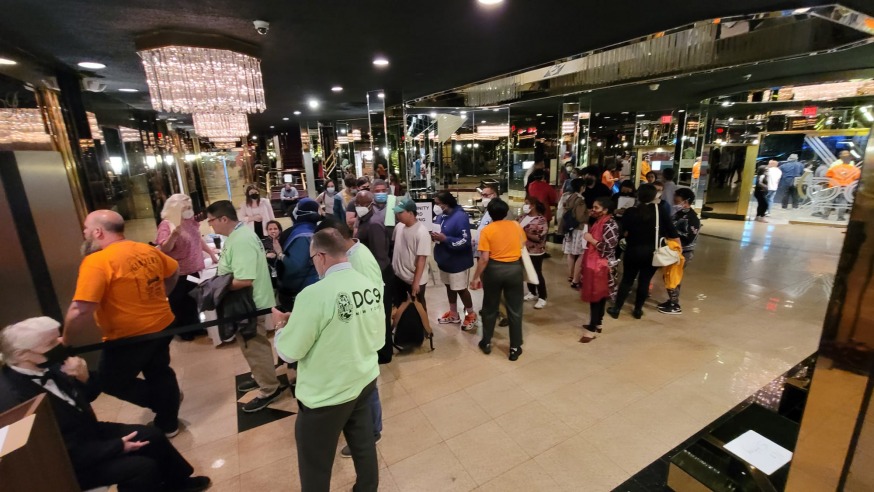
There were long lines of people waiting to speak at around 9:10 p.m. Tuesday (Photo: Michael Dorgan, Queens Post)
Many of the board members and speakers who provided public comment were concerned that the unions and the protesters were being pitted against one another.
“I am unequivocally pro-union,” said board member Diana Limongi. “My father has been a union man, my father is a shop steward and is 75 years old. So I am grateful for the healthcare, the fair wages and everything that a union job has given my father and my family growing up. But I can be pro-union and I can also be pro affordable housing.”
Meanwhile, board member Huge Ma said: “I struggle to vote for a development that provides us the bare minimum of 25 percent affordability.”
But many residents who live in NYCHA complexes spoke in support of the proposal.
“We need to embrace change and figure out what it is and try to come to a commonplace,” said Cole Austin, a Queensbridge resident. “We know we need jobs…Let’s get together. Let’s make it happen.”
Business organizations such as the Queens Chamber of Commerce, the Steinway Astoria Partnership and the Long Island City Partnership have all spoken in support of the project saying that it would boost the local economy.
“I’m here in full support of the Innovation QNS project,” said Tom Grech, president of the Queens Chamber last night. “I think it’s important for folks to understand and know the following: The rest of the country and the world is not standing still. This is a great project that will bring over 2,800 apartments including 700 affordable homes.”
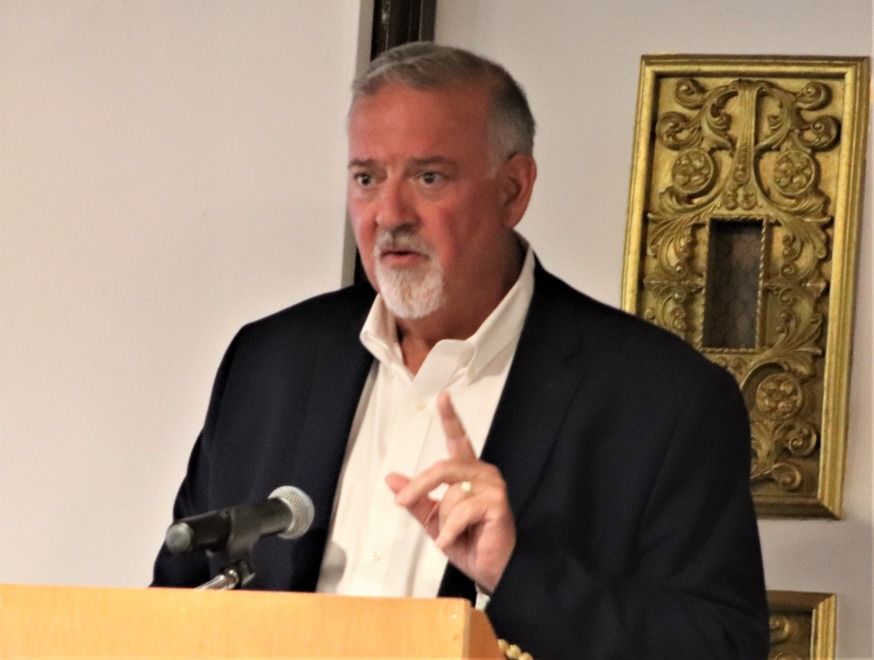
Tom Grech, the president and chief executive officer at Queens Chamber of Commerce
(Photo: Michael Dorgan, Queens Post)
Many non-profit and church leaders—including those promised space in the development– also spoke in support of the project last night, including representatives of HANAC and Jacob A. Riis Settlement.
They said that the project would allow them to provide more services to local residents.
Many speakers who opposed the project were immigrants or the children of immigrants. They represented the Queens melting pot– hailing from Greece, South America, Asia and the Middle East.
“I’m here to implore you to vote no to this rezoning,” said one Hispanic resident. “Astoria was the first place my mother came when she arrived. My family lived and worked here happily for years because it’s a welcoming place of opportunity…This will only push people out. The overwhelming number of people who will move will be wealthy drastically undermining the ability of the working class and immigrants to remain.”
Meanwhile, the vice president of the Ravenswood Resident Association said that the affordable housing is not truly affordable. “It is not inclusive of extremely low-income families and disregards many poor and working-class residents.”
Evie Hantzopoulos, who heads the board’s Housing Committee, spoke prior to the vote.
She said that the average Queensbridge and Ravenswood resident does not earn enough to even qualify for the affordable housing. She said that zero units would—in essence—be for them.
The board took the vote, with a list of recommendations.
The recommendations include caps on the size of the development for context. Erion said that the Land Use Committee recommended a maximum height of 17 stories on Northern Boulevard, 11 stories on the midblocks and 8 stories on 35th Avenue.
The board also recommended the developers come before the board if they plan to lease a retail space in excess of 10,000 square feet to a single tenant.
The final recommendation dealt with the amount of affordable housing that the board believes needs to be set aside. The board said that it would study the income levels of residents in the area to make a determination. However, board members discussed making 75 percent of the units affordable prior to the vote.
The board’s vote is advisory, and the application will now go before Queens Borough President Donovan Richards who will have 30 days to make a recommendation. His recommendation will also be advisory.
The City Planning Commission will then have 60 days to vote on it. The CPC vote is binding–although it is rare for it to reject it.
The final step in the process is for the plan to go before the city council, which ultimately decides the fate of the application.
Councilmember Julie Won, who represents the district, has shown little enthusiasm for the project.
Last night after the vote was taken, the group “Astoria is Not for Sale” celebrated the board’s rejection of the project and posted on Instagram. “We did it.”
Won, who will ultimately determine the fate of the development, was one of 400 followers to have liked the post.
The developers, however, have not given up and issued a statement following the vote.
“The City’s formal review process is designed to gather input from the public, and we’re glad to receive that input even as we continue to make the case that New York City – perhaps now more than ever – needs this $2 billion private investment that will create urgently needed mixed-income homes and 5,400 jobs, while generating hundreds of millions of dollars to support infrastructure, public safety, and education.”
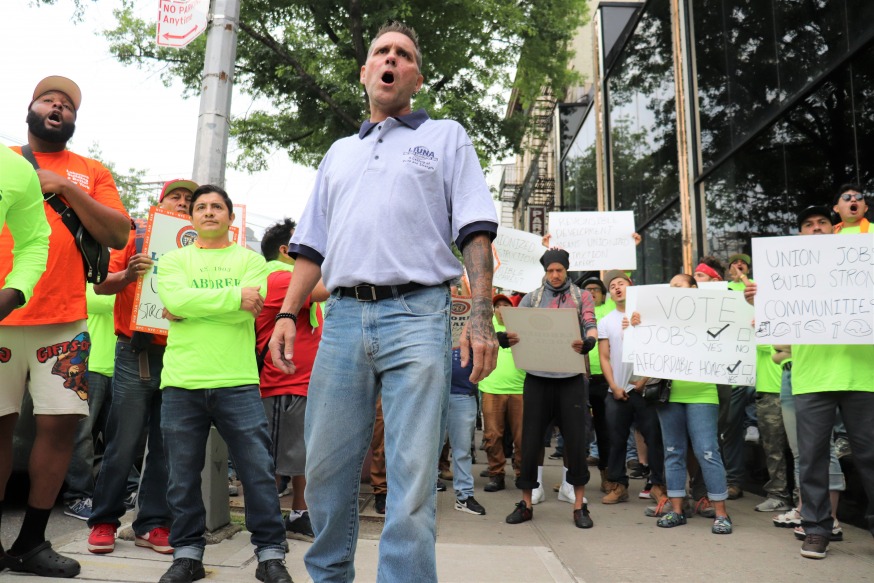
John Wund, the assistant director of organizing at Local 79 Construction and General Building Laborers (Photo: Michael Dorgan, Queens Post)
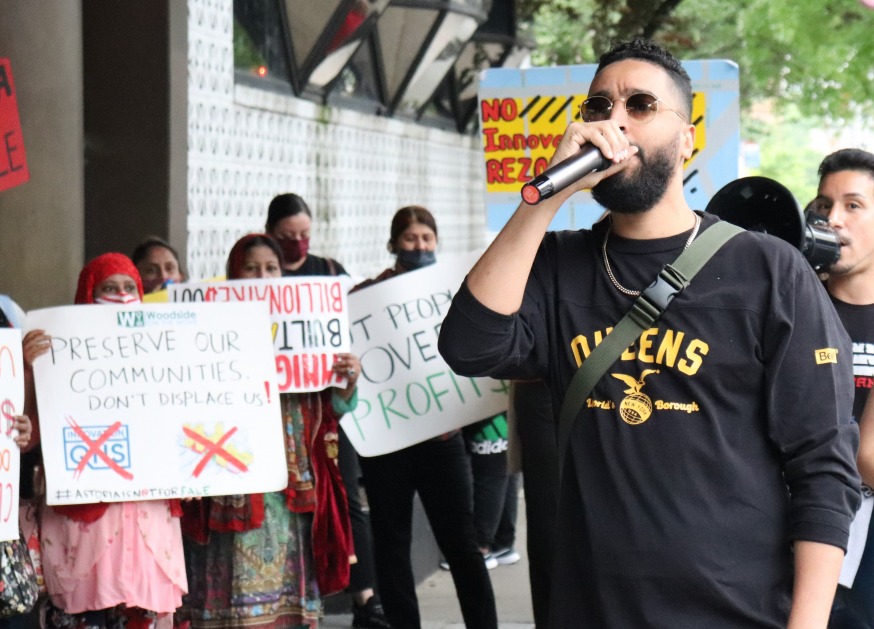
Activist Dannelly Rodriguez speaking outside Astoria World Manor (Photo: Michael Dorgan, Queens Post)
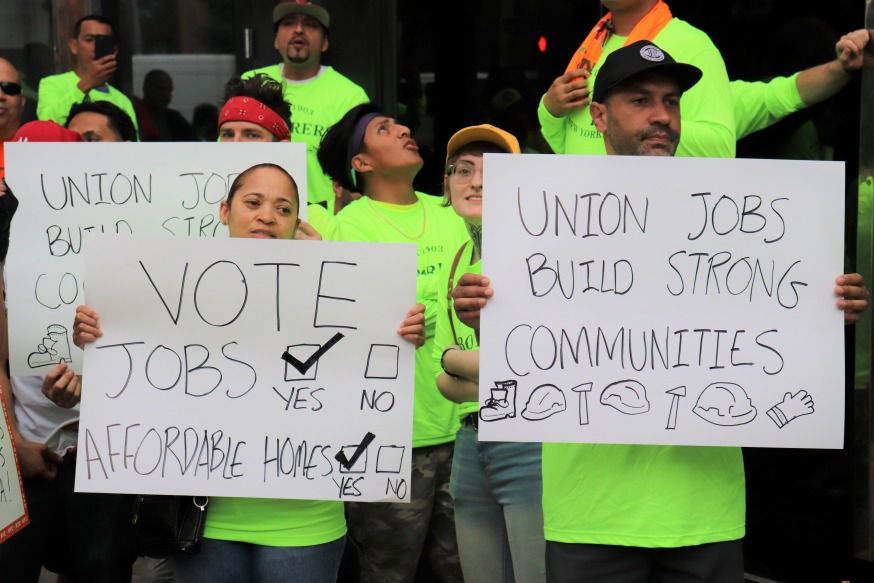
Members of the painters union carrying signs (Photo: Michael Dorgan, Queens Post)
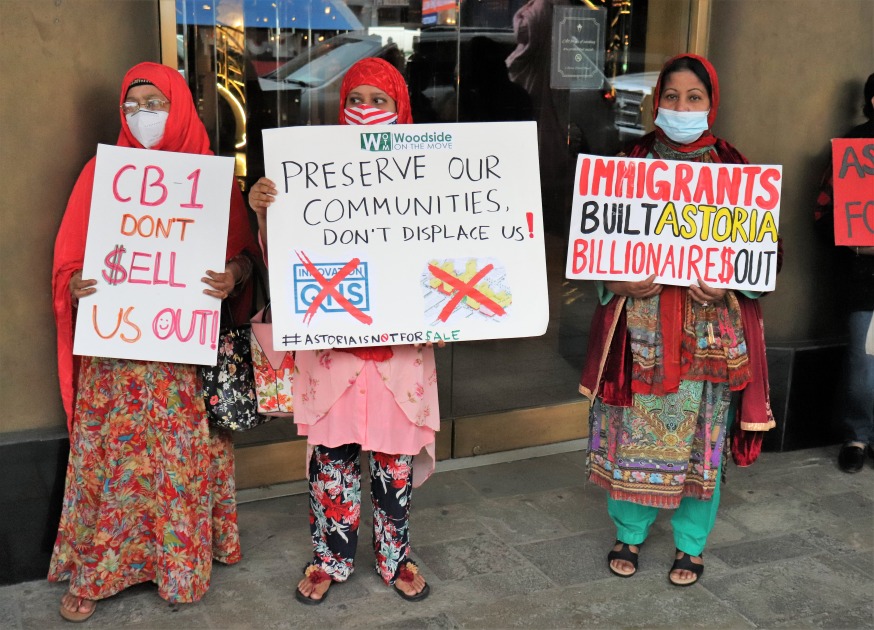
Women opposing Innovation QNS carrying signs (Photo: Michael Dorgan, Queens Post)

Demonstrators in favor of the development (Photo: Michael Dorgan, Queens Post)
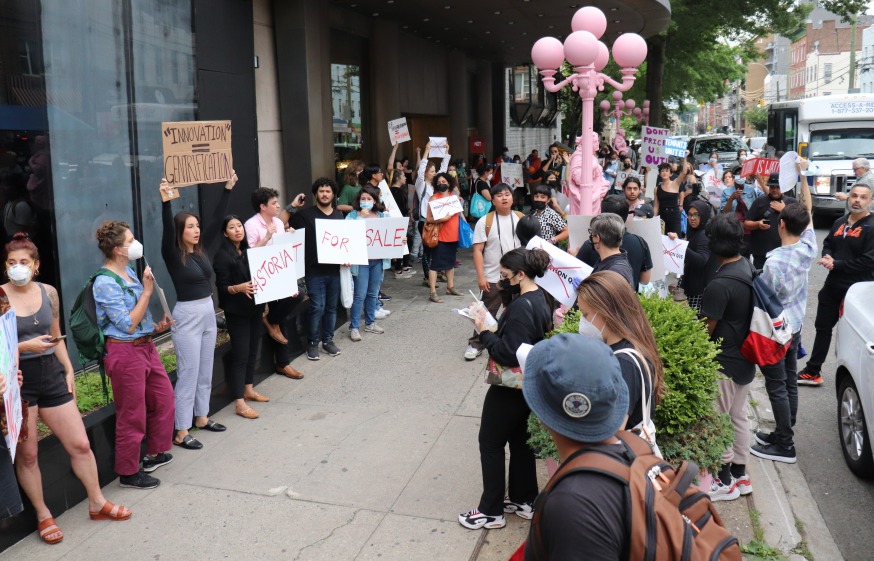
The scene outside the Astoria World Manot ahead of the vote (Photo: Michael Dorgan, Queens Post)
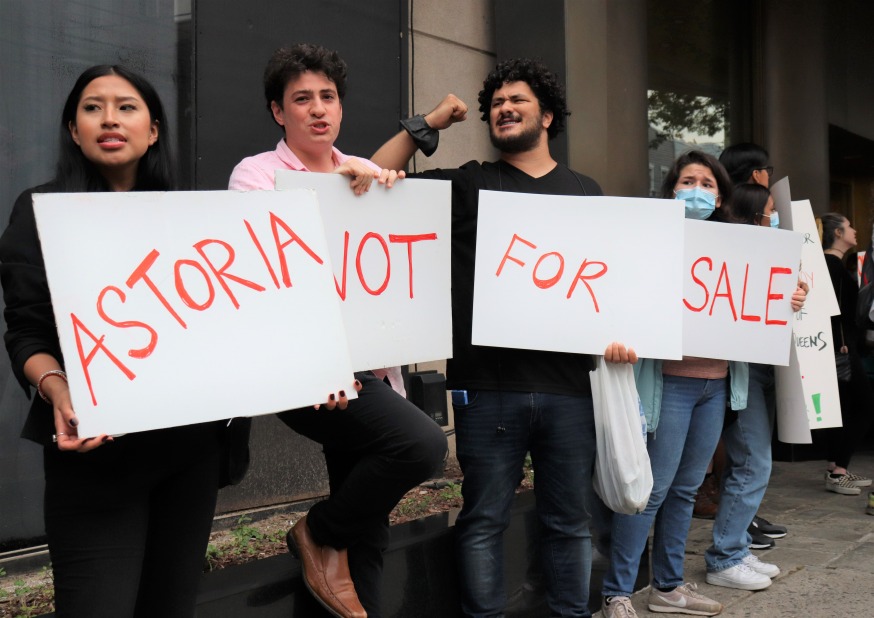
People opposing Innovation QNS carrying signs (Photo: Michael Dorgan, Queens Post)
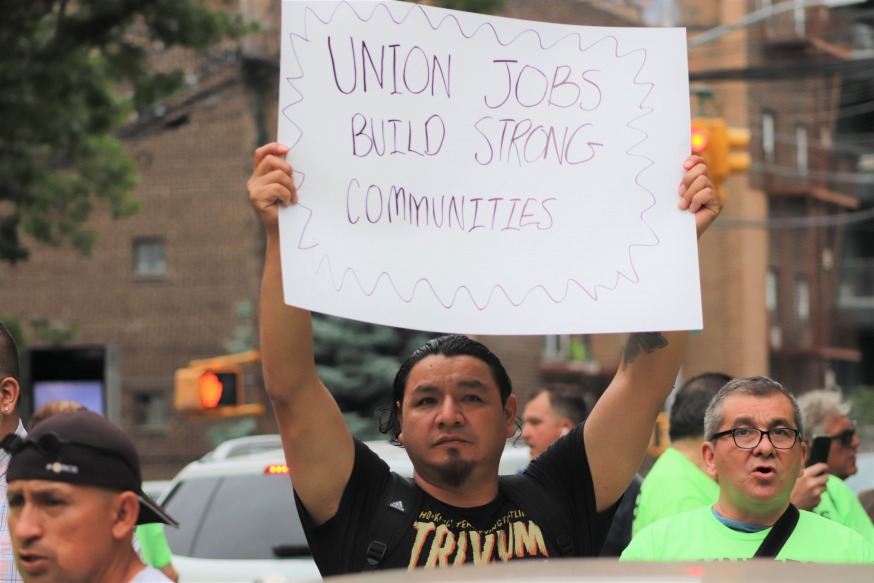
A man in favour of Innovation QNS carrying a sign (Photo: Michael Dorgan, Queens Post)
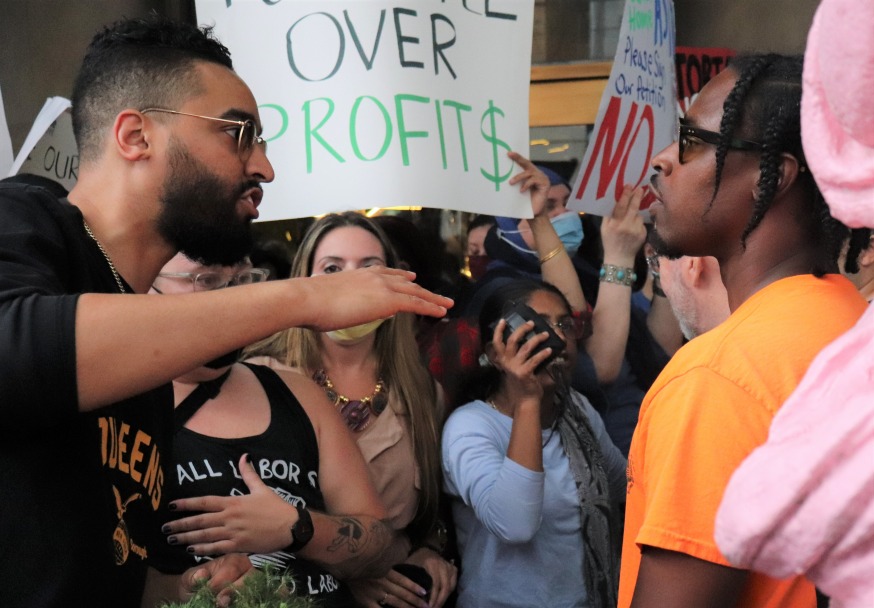
Demonstrators from opposing sides speaking to one another (Photo: Michael Dorgan, Queens Post)
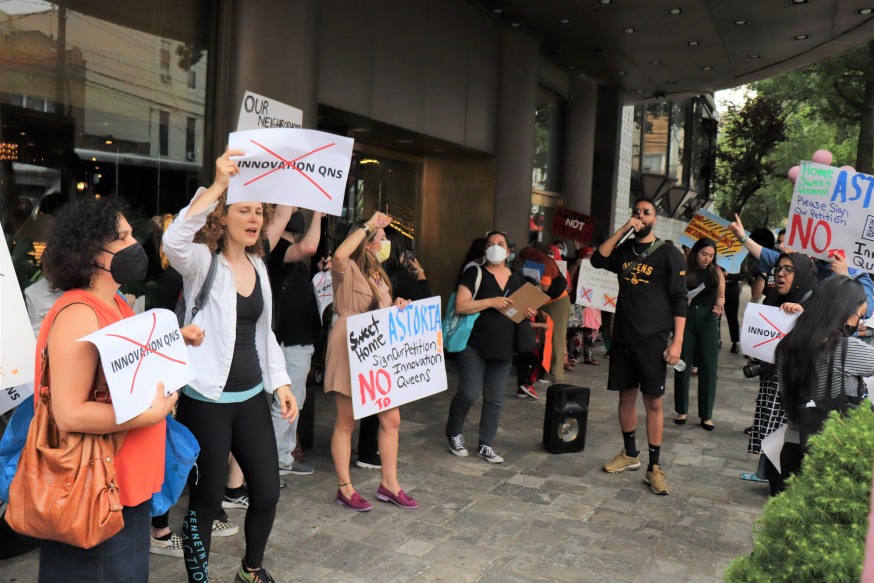
Protesters outside the Astoria World Manor (Photo: Michael Dorgan, Queens Post)
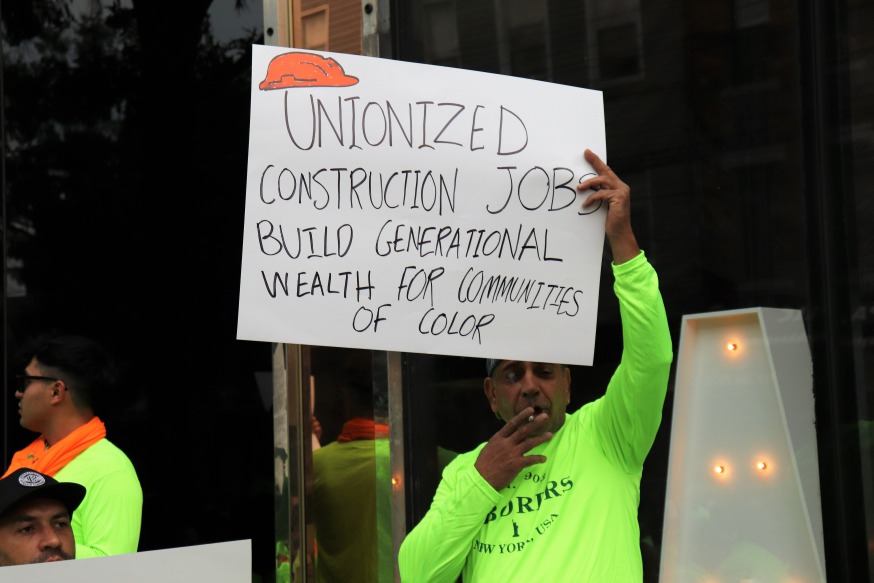
A union worker holding a sign (Photo: Michael Dorgan, Queens Post)
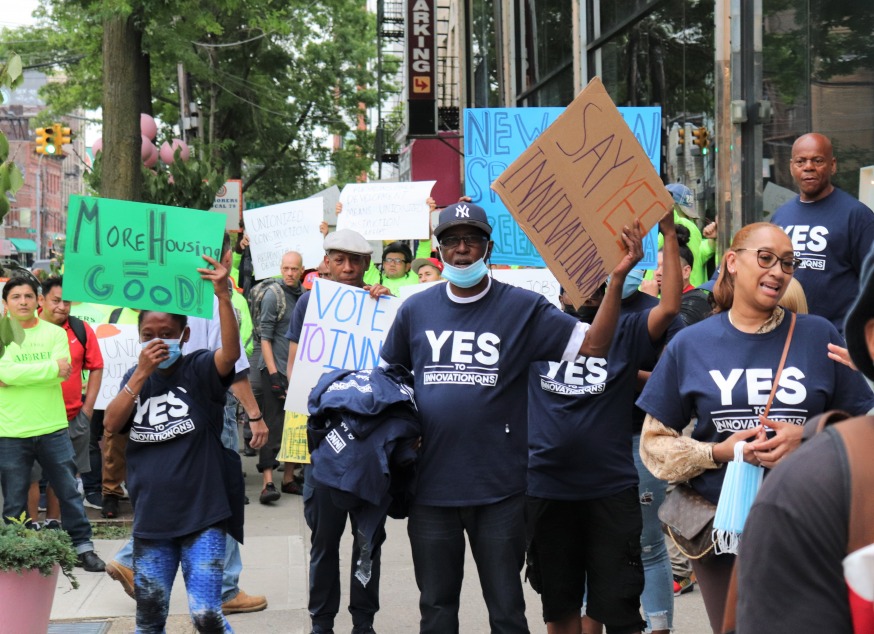
Supporters of Innovation QNS wearing identical shirts and holding up signs (Photo: Michael Dorgan, Queens Post)
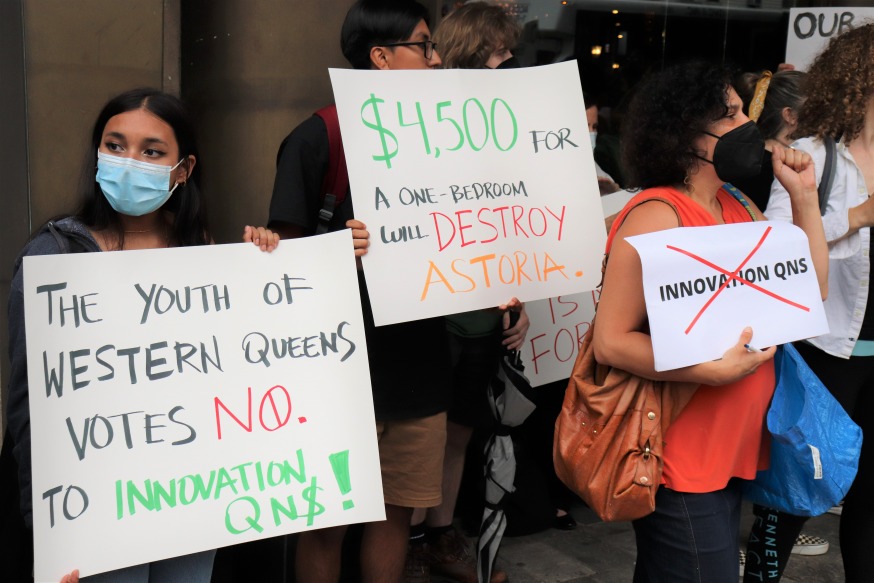
People opposing Innovation QNS carrying signs (Photo: Michael Dorgan, Queens Post)
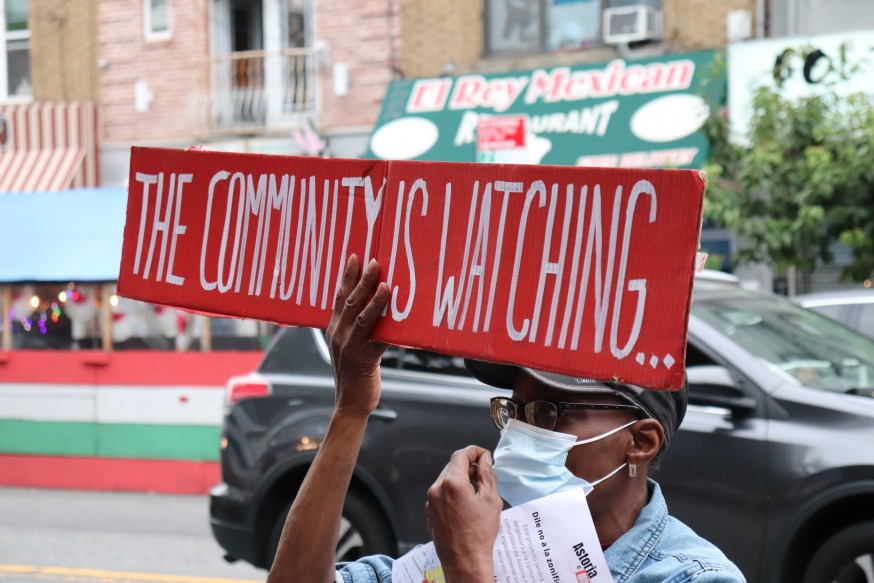
A protester opposing Innovation QNS with a sign (Photo: Michael Dorgan, Queens Post)
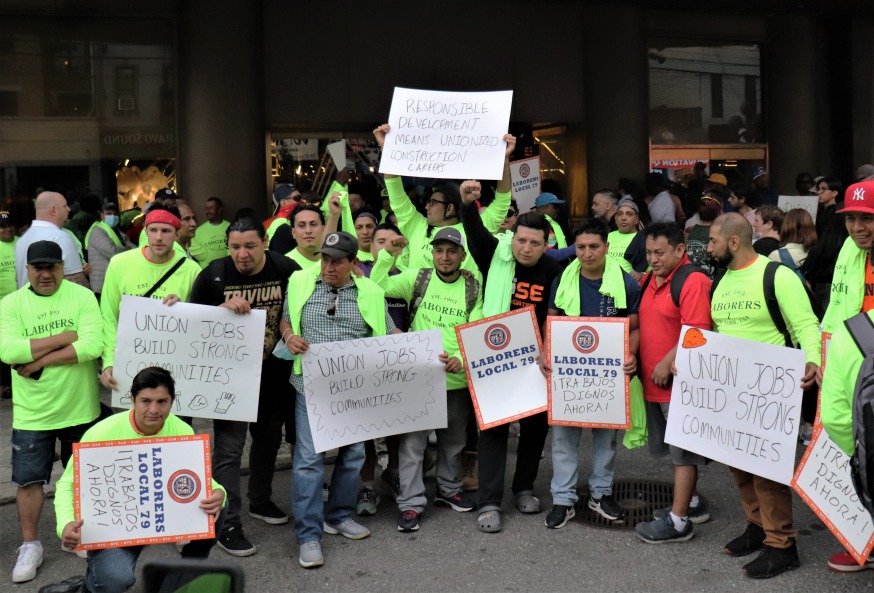
Members of the painters union carrying signs (Photo: Michael Dorgan, Queens Post)
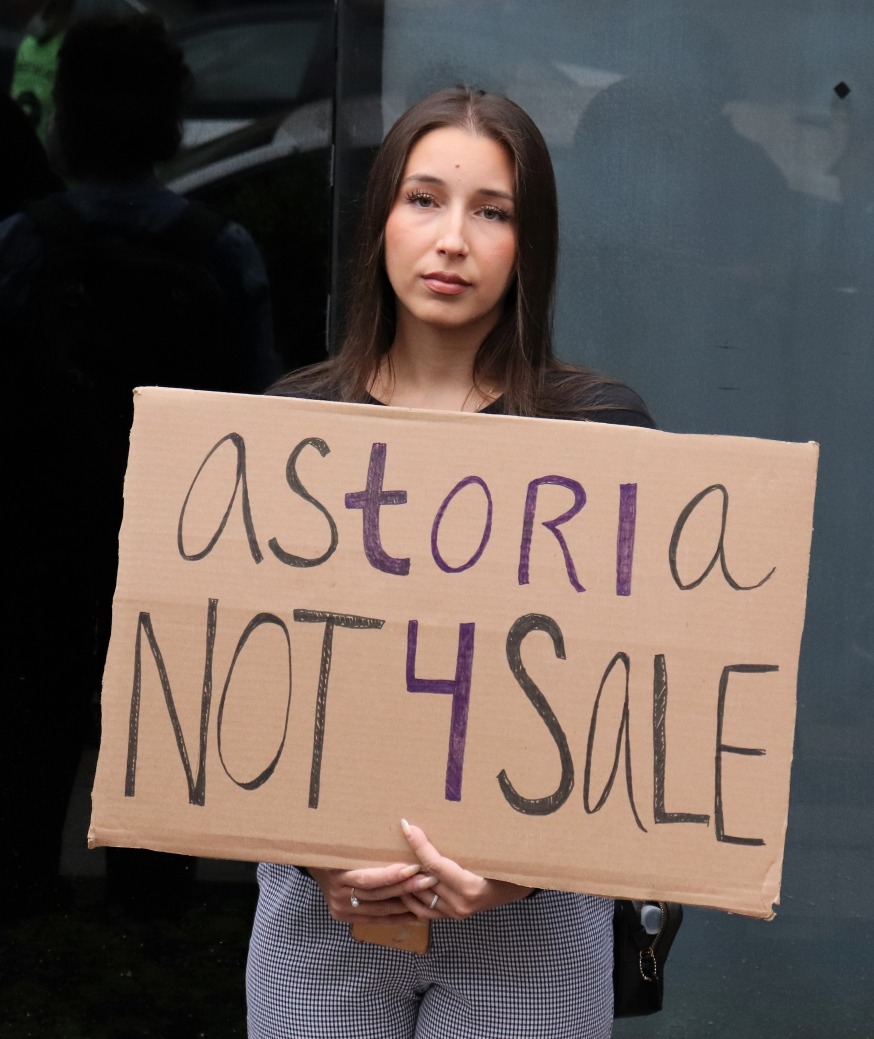
A woman with an “Astoria Not 4 Sale” sign (Photo: Michael Dorgan, Queens Post)
